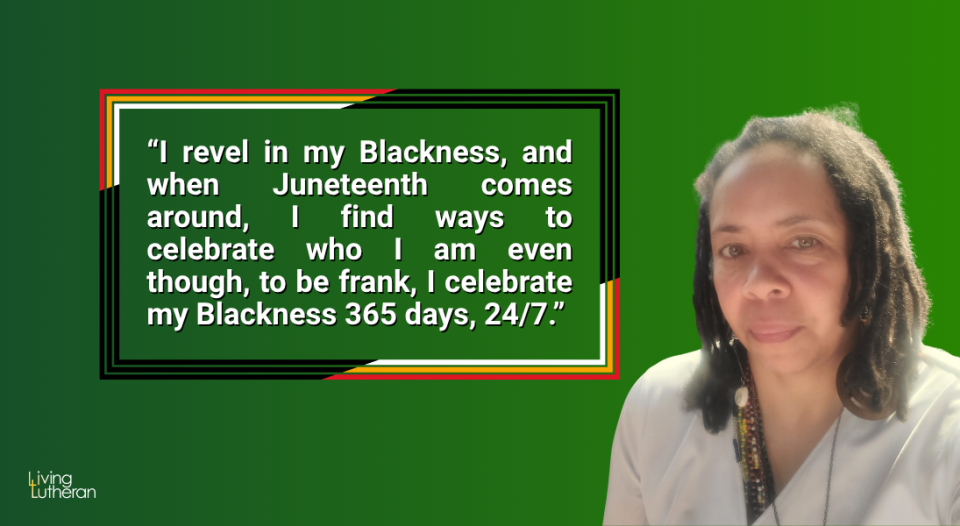Kwame Pitts (she/her) serves as a mission developer for Community of Good Neighbors (CGN) Buffalo, a mobile food pantry combating food disparity and inequity on the east side of Buffalo, N.Y. Living Lutheran spoke with her on what it means to hold space for both joy and grief during a month that includes Juneteenth, Pride and commemoration of the Emanuel Nine.
Living Lutheran: June is a month of both celebration and remembrance—it holds Juneteenth, a day honoring Black freedom and resilience; Pride, a month affirming the LGBTQ+ community; and June 17, a somber day of repentance and mourning for the Emanuel Nine. As a pastor, how do you guide people in holding space for both joy and grief, celebration and sorrow, during this complex season?
Pitts: My context is complex because CGN is not a congregation. It is more of a place where we practice theology in the streets. But collectively, regardless of where I am, I think my responsibility to my community is showing up as both a practical womanist theologian and as a human sibling, creating a sacred space where people can come and allow their emotions to flow about all these things. It means pride in showing up authentically as I am and affirming and conversing with folks, reminding them that they are loved just as they are.
When the Emanuel Nine were taken from us, I was involved in various discussions and creating ritual worship space around libations and remembrance of these collective ancestors. I think just holding space virtually and reminding folks who are not people of culture and language that they have a responsibility to use their white privilege to turn the tide of fascism, oppression and racism that continues to desecrate this country.
How do you personally or pastorally reflect on the meaning of Juneteenth?
Juneteenth is liberation. Let’s be transparent: this country does not recognize Black bodies as necessary, vital or equal, even as this country used and abused my ancestors for wealth, gain, and horrific entertainment and experimental exploitation. Therefore I revel in my Blackness, and when Juneteenth comes around, I find ways to celebrate who I am even though, to be frank, I celebrate my Blackness 365 days, 24/7. It also means not muting or masking myself around people who do not identify as people of the African diaspora. There will be those in this church who do not understand why we celebrate Juneteenth; however, Juneteenth reminds me of what Dr. James Cone (an American Methodist minister and theologian) said: God indeed stands with the oppressed.
Where do you see the Spirit moving today—in your community, in Black joy, in queer liberation, in the church?
I recently returned from OFM [TK] network contextual training in New Orleans, where I saw the Spirit moving. It was an ecumenical gathering, so there were folks from all over. Collectively we affirm we will not be silent or retreat from prophetically uplifting our issues, voices and demands for civil and human rights access.
Additionally, the Holy Spirit is calling us toward a time for rest and renewal. That’s where I see the Spirit moving! The Spirit calls for us to be reveling in our sacredness and bodies. Although we may not be able to shift the narrative nationally, we can, in turn, start working within our communities, caring for one another through mutual aid, through teachings, through sharing of food and celebration, dancing in the streets and being authentically Black. That is where I see the Spirit moving. When I went to the Pride parade, it was just a time of celebration, and I saw it in my two young adults who identify in the LGBTQIA community. I have constantly reminded them that they are free to be who they feel they are, and therefore, my job as a parent and, for that matter, both myself and my spouse, our job is to make sure that they have equal access and that no one tries to steal their joy or mute their light. To be Black means defining us as children of light, culture and nature; we are called to be leaders, generational trauma cycle breakers, and healers.
How has your understanding of liberation been shaped by your faith? Are there particular Scriptures, spiritual practices or lived experiences/traditions that ground or inspire that vision of freedom?
When I attended seminary at the Lutheran School of Theology at Chicago, because of mentors like Dr. Cheryl Pero and Dr. Pete Pero, Dr. Linda Thomas and Dr. Richard Perry, to name a few. Their connection, their teaching and their mentorship fueled me toward total integration into Black liberation theology and womanist theology fully. It continued when I attended Chicago Theological Seminary for my second master’s and was mentored by Dr. JoAnne Marie Terrell and Dr. Christophe Ringer, furthering my thirst for complete transparency of what it means to be Black, engaging in Western Christianity spaces and never backing down.
This is where I also continue to be embedded in what it means to be a womanist theologian and a Black practical theologian; there is unbridled joy and unashamedly being “us” and not backing down, not closing off their voice to placate white supremacy. That may sound uncomfortable, but as Lutherans, aren’t we supposed to call a thing what it is? Having been ordained for almost 10 years and with many experiences, it only further affirmed [that I need] to keep these roots deep within my very being and spirit and never be unauthentic again.
What would you say to people of African descent exploring their spirituality within the Lutheran tradition today?
I think my answer would be, never lose your Blackness. Never let anyone tell you that Black liberation theology or womanist theology is subpar or just a footnote. Never lose your Blackness, because there are many ways in which our worship, the African American church, speaks volumes. Our spiritual songs, our vibrant dances, our powerful testimonies —these are all ways in which we celebrate the Creator and challenge those who try to dictate how we should worship. Don’t let anyone tell you that what you believe in or how we worship or how we praise dance or how we testify, how we show up and worship or how we preach is wrong. The Creator gave us voice and license. There’s no right way to express worship; there is no right way how you show up.
What words of encouragement would you offer to queer Lutherans of African descent who are navigating a world that often attacks their dignity—because of their race, gender expression, sexuality or identity?
I would say, refuse to be silent, refuse to back down, don’t conform to make other people comfortable. Don’t hide who you are. Challenge folks, because every time someone says [something] disrespectful, racist, homophobic, transphobic, or characterizes your humanity with a stereotype, don’t be afraid to ask the question: what was Jesus’ greatest commandment? We all know what that is! Ask them, how can you love the Creator and hate me? Do you realize we all come from the same Creator and are unconditionally loved and uplifted?
What gives you hope right now?
What gives me hope is the power of inclusive worship. This summer I will serve in a local [United Church of Christ] church as their sabbatical pastor while my dear friend and sister goes on sabbatical. Her community welcomes all! It’s diverse, it’s inclusive, and everyone is equitable. They come from all walks of life, all experiences and economic classes. Her community is one of many authentic models of how church should be, reflecting safe community and sacredness. I have partnered with them in the past three to four years in a variety of ways, and we will be engaging in rest and renewal, intentionally. I am so excited to be with them and learning from them how the gospel and the Holy Spirit speaks and moves through them.





